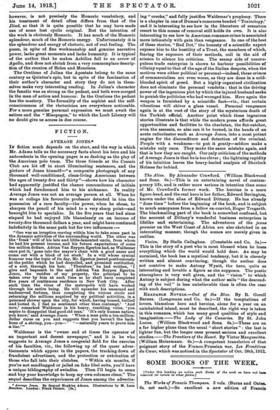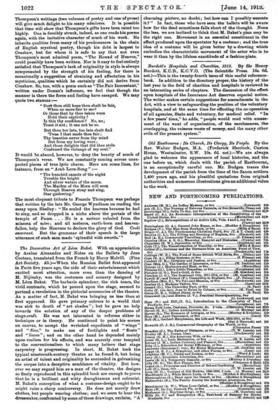SOME BOOKS OF THE WEEK.
frnder this heading we valve such Looks of the week as hare not hams seserred for review sts other forms.]
Thompson's writings (two volumes of poetry and one of prose) will give much delight to hie many admirers. It is possible that time will show that Thompson's gifts have been rated too highly. One is forcibly struck, indeed, as one reads his poems again, with the imitative character of much of his work. He inherits qualities from many of his predecessors in the chain of English mystical poetry, though his debt is largest to Crasbaw, but for whom it is safe to say that not even Thompson's most admired poem, "The Hound of Heaven," could possibly have been written. Nor is it easy to feel entirely satisfied that Thompson's lack of originality in style is always compensated by the strength of his feeling, for there is occasionally a suggestion of straining and affectation in his mysticism, qualities which he certainly did not derive from Crashaw. So, too, with a poem such as " The Fair Inconstant," written under Donne's influence, we feel that though the manner is there the force and feeling have escaped. We may quote two stanzas :-
" Dos* thou still hope thou shalt be fair, When no more fair to me? Or those that by thee taken were Hold their captivity ?
Is this thy confidence ? No, no; Trust it not ; it can not be so.
But thou too late, too late shalt find 'Twas I that made thee fair ; Thy beauties never from thy mind But from my loving were ; And those delights that did thee stole Confessed the vicinage of my soul."
It would he absurd, however, to deny the beauty of much of Thompson's verse. We are constantly coming across unex- pected pieces of true lyric charm. Here are some lines, for instance, from an " Arab Love-Song " :-
" The hunched camels of the night Trouble the bright
And silver waters of the moon. The Maiden of the Morn will soon Through Heaven stray and sing, Star gathering."
The most eloquent tribute to Francis Thompson was perhaps that written by the late Mr. George Wyndham on reading the essay upon Shelley : " He scaled the heavens because he had to sing, and so dropped in a niche above the portals of the temple of Fame. . . . He is a meteor exhaled from the miasma of mire ; and all meteors, earth-born and heaven-
fallen, help the Heavens to declare the glory of God. Coeli enarrant. But the grammar of their speech is the large
utterance of such men made `splendid with swords.'"















































 Previous page
Previous page